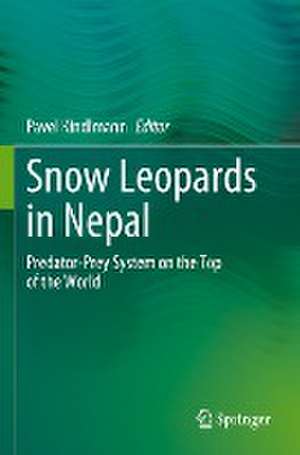Snow Leopards in Nepal: Predator-Prey System on the Top of the World
Editat de Pavel Kindlmannen Limba Engleză Paperback – 2 oct 2023
The first part, describing the main features of snow leopard and its main prey ecology, is followed by a comprehensive review of data available on its abundance and threats to its survival. The third, most extensive part—the substance of the book—presents new data from 15 years of intensive camera trapping combined with scat sampling. These data are analyzed by means of advances GIS and genetic techniques, which yields a large amount of conservation implications. The purpose of this book is to provide a tool for both environmental managers and researchers to find quickly what is known about this species for conservation planning and for an effective protection of snow leopard. However, enthusiasts interestedin wild cats may welcome the book, too.
| Toate formatele și edițiile | Preț | Express |
|---|---|---|
| Paperback (1) | 553.68 lei 38-44 zile | |
| Springer International Publishing – 2 oct 2023 | 553.68 lei 38-44 zile | |
| Hardback (1) | 567.07 lei 38-44 zile | |
| Springer International Publishing – oct 2022 | 567.07 lei 38-44 zile |
Preț: 553.68 lei
Preț vechi: 692.10 lei
-20% Nou
Puncte Express: 831
Preț estimativ în valută:
105.95€ • 115.44$ • 89.28£
105.95€ • 115.44$ • 89.28£
Carte tipărită la comandă
Livrare economică 19-25 aprilie
Preluare comenzi: 021 569.72.76
Specificații
ISBN-13: 9783031113574
ISBN-10: 3031113578
Pagini: 211
Ilustrații: XIV, 211 p. 87 illus., 76 illus. in color.
Dimensiuni: 155 x 235 mm
Ediția:1st ed. 2022
Editura: Springer International Publishing
Colecția Springer
Locul publicării:Cham, Switzerland
ISBN-10: 3031113578
Pagini: 211
Ilustrații: XIV, 211 p. 87 illus., 76 illus. in color.
Dimensiuni: 155 x 235 mm
Ediția:1st ed. 2022
Editura: Springer International Publishing
Colecția Springer
Locul publicării:Cham, Switzerland
Cuprins
Distribution, Threats and Conservation of Snow Leopard Throughout the World.- Snow leopard in Nepal – A Case Study.- Methods of Estimating Snow Leopard Abundance.- A Key for Identifying the Prey of Snow Leopard in Nepal Using Features of the Structure of the Hair of their Prey Present in their Faeces.- Abundance of Snow Leopards and their Prey in the Annapurna and Everest Regions of Nepal.- Assessment of the suitability of particular areas in Nepal for Snow Leopard based on MaxEnt Modelling.- Non-Invasive Genetic Sampling of Snow Leopards and other mammalian predators in the Annapurna and Sagarmatha regions of Nepal.- Snow Leopard-human Conflict and Effectiveness of Mitigation Measures.- Description of the Study Areas.
Notă biografică
Pavel Kindlmann is professor of ecology at the Charles University in Prague and Head of Department of Biodiversity Research in the Global Change Research Institute of the Academy of Sciences of the Czech Republic. His main interests include population and metapopulation dynamics and evolution of life history strategies with a special emphasis on insect herbivores, orchids and large mammals. He authored or edited several books on population systems of orchids and on conservation biology, including the Himalayan region and published more than 150 scientific papers in prominent journals.
Textul de pe ultima copertă
Snow leopard (Panthera uncia) is an endangered species, and its population size is steadily declining. The main threats to the snow leopard include illegal trade, conflict with locals (human-snow leopard conflict), lack of conservation, awareness and policy, and climate change. To avoid its extinction, we badly need a good knowledge of its ecology, distribution and population dynamics, including interactions with its prey, which will take into account various scenarios of changes in climate and human impact on snow leopard. This book aims to put together a considerable amount of unpublished data collected by the co-author of most of the chapters, Bikram Shrestha, which might be useful for other researchers working on snow leopard. In addition, researchers might find it useful to have a key for determining the diet of snow leopard based on remnants of its food in its scats. Last, but not least, based on the difficulty we experienced trying to compare and combine differentsets of results, we propose a general methodology for collecting data. Thus, this book is not an all-encompassing compendium, but an attempt to fill some gaps in the literature and to show, how to publish new data on snow leopard in a useful and workable way.
The first part, describing the main features of snow leopard and its main prey ecology, is followed by a comprehensive review of data available on its abundance and threats to its survival. The third, most extensive part—the substance of the book—presents new data from 15 years of intensive camera trapping combined with scat sampling. These data are analyzed by means of advances GIS and genetic techniques, which yields a large amount of conservation implications.
The purpose of this book is to provide a tool for both environmental managers and researchers to find quickly what is known about this species for conservation planning and for an effective protection of snow leopard. However, enthusiasts interestedin wild cats may welcome the book, too.
The first part, describing the main features of snow leopard and its main prey ecology, is followed by a comprehensive review of data available on its abundance and threats to its survival. The third, most extensive part—the substance of the book—presents new data from 15 years of intensive camera trapping combined with scat sampling. These data are analyzed by means of advances GIS and genetic techniques, which yields a large amount of conservation implications.
The purpose of this book is to provide a tool for both environmental managers and researchers to find quickly what is known about this species for conservation planning and for an effective protection of snow leopard. However, enthusiasts interestedin wild cats may welcome the book, too.
Caracteristici
Is the only book presenting a comprehensive information about the population dynamics Presents the comprehensive review, new, previously unpublished data from 15 years of intensive camera trapping combined with scat sampling and their analyses will be presented
